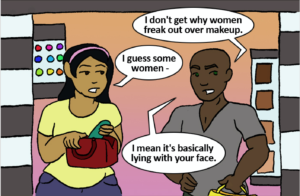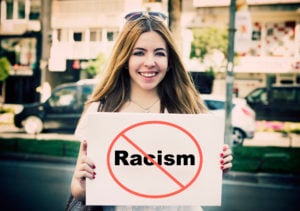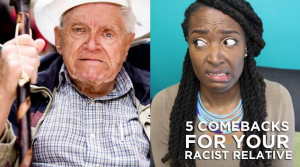I cannot call my sister cute.
That’s not because she never does anything cute. In fact, when she wears her frog beanie or hugs her plush dinosaur – things that would make even Voldemort look adorable – sometimes I slip up and I tell her, “Caley, you look so cute!”
And she flinches, as though I’d just mortally insulted her.
And in Caley’s world, the world many disabled people share, I have. Because words are weapons, and even the sweetest sounding ones can cut, can be used to demean and diminish those they target.
“Cute” is one of the words that you’d never think of as offensive, but Caley would rather I used any other four letter word around her – any word but that one.
Before Caley came to college, I let her stay in my dorm room for a while to dip her toes into the college experience. While she was staying with me, an acquaintance came by and spotted Caley.
People can generally tell that something is “different” about Caley and often guess it has something to do with a disability, although they can’t quite put their finger on what that disability is. This acquaintance was apparently one of these people, and when she determined Caley was “different,” she adapted her own demeanor towards Caley accordingly.
When she finally left the room, I was left with a very odd sensation. Something felt very wrong and weird about the interaction I’d just seen, but I couldn’t quite label what it was.
After a lifetime of defending Caley from peers who meant her harm, verbally or otherwise, I’d gotten pretty good at determining subtle undertones of anger, taunting, and verbal barbs. But try as I might, I couldn’t find a single instance of any of those in her visit. In fact, my acquaintance had been very nice – even saccharinely so – to Caley.
Why, then, was I left with a bad taste in my mouth?
Finally, I figured it out: My acquaintance had treated Caley like she was a small child.
As soon as she’d gathered enough data to dump Caley into her brain’s “disabled” category, my acquaintance had immediately switched to baby speech. She’d spoken very slowly, exaggerating every word, took her vocabulary down a few notches, and responded with overacted enthusiasm to every phrase that came out of Caley’s mouth. At one point, she literally patted Caley on the head.
And, what’s more, every few sentences or so, my acquaintance would look up at me with a bright smile and utter that damning phrase: “Your sister’s so cute!”
Despite knowing that Caley was going to be coming to the Honors college next year, and therefore quite smart, upon sensing that vague feeling of disability, she’d immediately downgraded her view of Caley’s intelligence and maturity to that of a five-year-old.
And in this instance, as in many, this ableist-fueled demotion was encapsulated by one word: “cute.”
This is but one example of a deluge of such well-intended, but nonetheless offensive occurrences that Caley has dealt with her entire life. One of the first things that classmates, teachers, relatives, and random passers-by in the grocery store exclaim when they meet her is “You’re so cute!”
Now, if being called cute was the only infantilizing scenario Caley and other disabled people face, I could stop this article right here. Unfortunately, though, it’s not – not by a long shot.
There is a long list of ways we unknowingly change the way we talk to and interact with disabled people that are infantilizing and just plain messed up. But since I can’t list all of them, here are just the top six.
1. Talking to Someone Like They’re a Child (Or Worse Yet, a Pet)
Able Person: “Do you want to go to the store, sweetheart? Yes you do, yes you do! Awwww, you’re so cute!”
Disabled Person: …
I get it. Baby talk is cute and sweet. And whenever we see someone that we think of as cute, sweet, and somewhat lower in terms of cognition or development, we may be inspired to use this form of speech.
How do you know if you’re saying something that falls into this category? It’s pretty simple: If you’re using the same tone or phrases that you would use when talking to a baby, small child, or dog, then it’s not okay.
Another word of warning here: Even if you’re an equal opportunity baby talk speaker and use it with everyone, be aware that even if it’s not something based on your perceptions of a person’s “mental age,” it’s still something that, due to misuse by others, can be perceived of as hurtful by a disabled person.
While your intentions might be great, it’s more important to keep in mind the impact of your actions on the disabled person, rather than defend where you’re coming from.
When I was nannying full time, I did use “kid talk” (not quite baby talk, but close) so much at my job that it rubbed off on my actual speech. So when I met one of my sister’s friends with cerebral palsy, I made sure to tell her upfront of my recent adventures with kid talk. That way, she’d know it had nothing to do with her and everything to do with me. And, of course, I still tried not to use it.
2. Over-Simplifying Vocabulary or Over-Explaining Concepts
Able Person: “Let’s go to the mall! You know what a mall is, right? It’s that place where you buy things that you want like—you know—clothes and games and stuff.”
Disabled Person: (rolls their eyes)
If you’re over-simplifying or over-explaining beyond what a person needs, that means that you’re probably underestimating a person’s cognitive abilities based on assumptions related to their disability.
Now maybe the person legitimately needs the explanation. In that case, it’s fine to explain!
The deal is, however, that your behavior in explaining concepts or choosing vocabulary needs to actually match what the person themselves needs, rather than your assumption based on false stereotypes.
Ever heard of “mansplaining?” Well, there is also such thing as “ablesplaining” – when an able person assumes that, simply because of a person’s disability status, they can’t possibly know [fill in the blank] and proceed to “educate them” in a condescending way, as was happening in the example conversation.
It’s messed up, yet many well-intended able people are unintentional perpetrators.
So if you’re one of them and want advice on how to change, I’d suggest checking out this article.
3. Denying the Person the Right to Have Adult Speech Patterns, Habits, or Desires
Disabled Person: “Shit! I accidentally cut myself with this knife!”
Able Person: “Watch your language!”
Censoring another person’s self-expression through language, habits, or desires is not okay no matter what, yet this is an especially common thing we do to disabled people.
For some reason, disabled people are often held to be “pure” or “closer to [insert religious deity here].” And when they act like the regular, down to earth adults that they are, people can be shocked!
More than that, many people will attempt to force them back to the standards of mainstream acceptability for their language and activities that we use for children.
But they aren’t children. And they’re not somehow more pure than others, either. They’re adults, and that means they have the same needs and wants as an adult would – including sexual ones. (It’s important to note here, though, that while being disabled is not the same thing as being asexual, as in the rest of the world, the two can of course overlap.)
Swearing, checking out those you find attractive, and enjoying NC-17 rated movies are not the sole domain of able people. Yet that’s exactly how many people act.
This happens most frequently when a person has a communication disorder and relies on technology to help them communicate. Their vocabulary is easily censored by another person – either through denying the option of certain words on their device, or taking their device from them when they say certain things.
Just the same way that you don’t take someone’s voice away just because they say something you don’t like, you never take a person’s communication device away from them for that reason – or any reason, really.
4. Addressing Another Adult or Caregiver Instead of the Disabled Adult Themselves
Doctor: (addressing caregiver) “And how is she doing with these medications?”
Disabled Person: “They’re working really well, thanks.”
Doctor: (ignoring disabled person and again addressing caregiver) “Have you noticed any side effects?”
This is a real excerpt of a conversation that took place at Caley’s psychiatrist appointment.
This is a situation that repeated for the first six appointments we had with this doctor. The doctor would ask me something, Caley would respond, and the doctor would ask me yet another question, which Caley would again answer.
I was hardly taking part in the conversation at all. I only did when I thought Caley needed support (the reason I was there). And I explicitly asked the doctor to direct her questions to Caley. And yet, she continued to act like Caley wasn’t worth addressing.
In fact, the only times she ever addressed Caley were to fat shame her (see this article) and to tell her that she should be grateful to have a sister that was willing to take care of her as I was.
You can tell what message that sends: It says that Caley is so inconsequential, and her mental capacity so low, that she isn’t worth addressing except to lecture.
The only case in which a conversation is acceptable to be conducted solely between two able people about a disabled person who is right there in the room is when said disabled person is an infant.
Otherwise, even if the person is non-speaking and non-responsive, you continue to include them in matters involving them as much as you possibly can. To do otherwise is downright rude.
5. Not Taking a Disabled Person’s Opinions, Beliefs, or Desires Seriously
Disabled Person: I’ve decided to convert to Judaism.
Able Person: Sure you have. (rolls eyes condescendingly)
Sure, not having your beliefs taken seriously is an issue that most people run into at one point or another, able or disabled. But due to infantilization, which is inherently related to not taking someone seriously, this is something that occurs to disabled people much more frequently.
This can actually be a big issue with far reaching impacts throughout a disabled person’s life. The ability to have your desires and beliefs listened to is a basic human right, and yet it’s one that is often denied disabled people.
For instance, due to her sensory issues, Caley asked the dental hygienist to avoid flossing her during the cleaning. The hygienist nodded, then moved right on flossing Caley’s mouth anyways. Caley asked again for the hygienist to stop, and was yet again steamrolled over. The hygienist simply put numbing gel on Caley’s teeth (which didn’t solve the sensory issues) and moved right on flossing.
That didn’t solve the problem, and she didn’t ask Caley if she could do so. She just assumed that Caley’s opinions weren’t that important and proceeded to do whatever she, as an able person, wanted to do.
And if you’re thinking that these sorts of situations happen to every so often, you’re right. But here’s where it’s different.
You see, Caley runs into this issue so often that she’s begun only advocating for herself once – and then if she’s not listened to, she just gives up, feeling it’s pointless to argue if she’s only going to be ignored anyways.
Even if the disability is cognitive in nature, a person’s feelings are still their feelings, and they are every bit as important to take seriously coming from a disabled person as an able person.
6. Not Allowing Them to Be Independent
Disabled Daughter: “Hey, Dad, since I’ve had my driver’s license for a few years now, can you help me get a car like you helped my brother and sister?”
Able Father: “No. If you’re out on your own people are going to take advantage of you.”
There’s this idea among many caregivers that it’s too dangerous to allow a disabled person independence.
“What if their blood sugar drops at night and they don’t notice?” “If she starts dating, since she’s cognitively disabled, the guy’s just going to use her for sex and then leave.”
As you may have noticed, the reasoning behind some of these is pretty offensive. And even for legitimate concerns, like the blood sugar, these aren’t reasons to not allow a disabled person to be independent if they’re an adult and independence is within their capabilities.
What’s more, the way well-meaning family members (and even society as a whole!) perpetuates this idea traps disabled people in a false sense of dependence – one which they may even begin to internalize.
Just the same as if someone told you that you were ugly your whole life, you would start to believe it. So the same occurs to disabled people told they will always be dependent on others. It destroys self-confidence and can actually lead to a self-fulfilling prophecy.
***
I’m not saying you should ignore a person’s disability – it’s part of their life and definitely needs to be recognized so that you can give them accommodations.
But I am saying that you should treat a disabled person with the same respect that you would give an able-bodied person.
That’s all that’s being asked for – a bit of respect. The only question now is, are you willing to give it?
[do_widget id=’text-101′]
Creigh Farinas is a Contributing Writer for Everyday Feminism. She’s a graduate student pursuing a Master’s degree in Speech Language Pathology and who already has a B.A. in Psychology and a post-baccalaureate in Communication Sciences and Disorders. Creigh is still learning more every day, and her sister Caley reads, edits, and approves everything that Creigh writes about disabilities. You can see more of Creigh and Caley’s writing at Autism Spectrum Explained.
Caley Farinas is a Contributing Writer for Everyday Feminism. She’s a recent graduate with a Bachelor’s in Public Health who writes about the effect society has on the “disabled.” Caley writes from her experience as an Autistic woman with dysgraphia and anxiety disorders. Because of these disabilities, it is hard for her to write and she gets assistance from her sister Creigh in writing/typing. That said, any words that you see attributed to her are her own, and she edits and approves anything her sister Creigh types. You can see more of Caley and Creigh’s writing on their website Autism Spectrum Explained and their Facebook page.
Search our 3000+ articles!
Read our articles about:
Our online racial justice training
Used by hundreds of universities, non-profits, and businesses.
Click to learn more





















